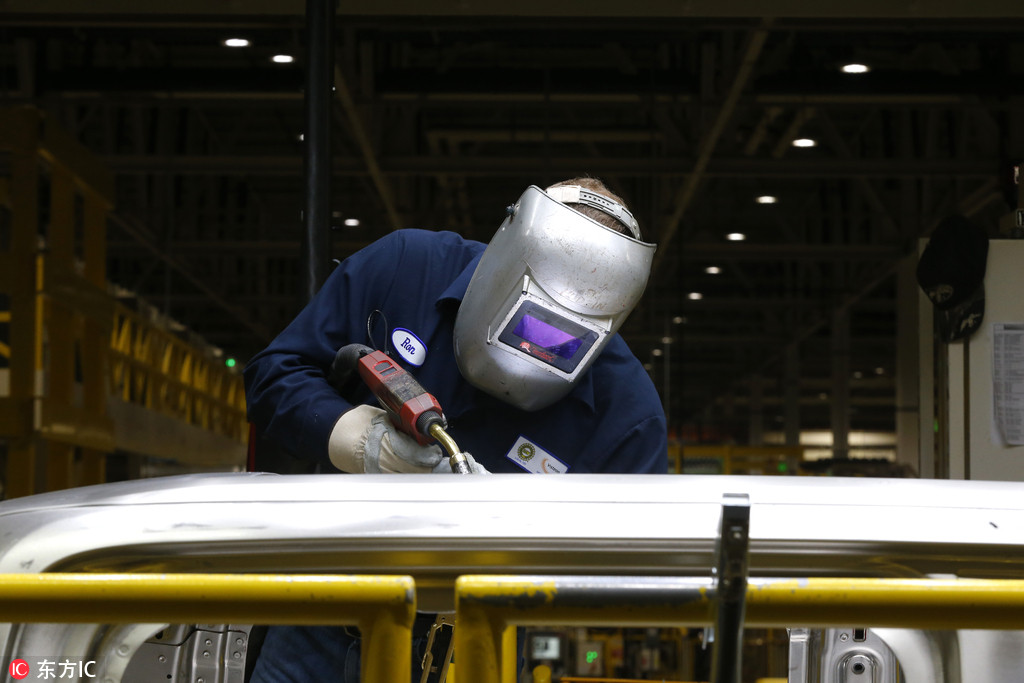Tariffs could kill many American jobs: US study


The proposed US tariffs on imports from China, and the retaliation promised by China, would cost hundreds of thousands of US jobs and greatly harm the US economy, according to a US study released on Tuesday.
The study shows that the proposed tariffs on $50 billion of Chinese imports announced by the Trump administration on April 3 and the proportional retaliation China announced the following day would reduce US gross domestic product by nearly $3 billion and destroy 134,000 American jobs.
Four jobs would be lost for every one gained from the tariff actions, according to the study conducted by Washington-based consulting firm Trade Partnership Worldwide LLC, on behalf of the National Retail Federation (NRF) and the Consumer Technology Association (CTA).
The result is in stark contrast to the Trump administration's downplaying the tariffs' impact on the US economy and jobs. US Commerce Secretary Wilbur Ross previously suggested that the impact would be small in the aggregate.
"As administration officials prepare to head to China for trade talks, the livelihoods of American workers hang in the balance. … We must resolve this trade dispute without resorting to job-killing tariffs and retaliation," NRF President and CEO Matthew Shay said in a statement.
The study warns that slapping tariffs on an additional $100 billion of Chinese imports would come at a significant cost to the US economy, decimating 455,000 jobs and shrinking GDP by $49 billion.
Trump threatened new tariffs on an additional $100 billion in Chinese imports just a day after China announced its retaliation proposals on products ranging from soybeans to cars and planes. China responded to the tariffs on $100 billion by pledging it will "fight back resolutely".
"Rising costs on farmers, manufacturers and service providers isn't the answer; it shows protectionism will weaken America," CTA President and CEO Gary Shapiro said. He added that the tariffs could wipe away the benefits of the recent tax reform and bring uncertainty to US businesses.
The study shows that the tariffs' impact would be felt across various sectors of the US economy, but agriculture would be hit especially hard. The net income of farmers would decline by 6.7 percent, and 67,000 agriculture jobs would be lost.
And the hit to farmers would more than double if the tariffs expanded to an additional $100 billion of products. Farmer income would drop by 15 percent, and jobs in the sector would decline by 181,000.
The report says that the tariffs plus retaliation will hurt every US state, including those in the Rust Belt, many of which voted for Trump in the 2016 presidential election. The 10 states that would suffer the highest job losses are California, Texas, Washington, New York, Georgia, Missouri, Pennsylvania, North Carolina and Ohio.
Joseph Francois, the lead researcher of the study, is managing director of Trade Partnership Worldwide LLC and former head of the Office of Economics at the US International Trade Commission. It is the most detailed report so far on the impacts of the tariffs.
The Trump administration has not released any research that quantifies the impact of the tariffs on US economy and jobs.
The report was released shortly before US Treasury Secretary Steven Mnuchin will head a high-profile delegation to China for trade talks on Thursday and Friday.
Ross on Tuesday expressed some hope for the upcoming meetings in Beijing. "I wouldn't be going all the way over there if I didn't think there was some hope," he said on CNBC.
NRF and CTA are among many US business groups that oppose Trump's tariff actions. In mid-March, dozens of US trade groups appealed to Trump not to resort to tariff actions that would seriously hurt their businesses. Those include the Section 301 tariffs on China and the Section 232 steel and aluminum tariffs imposed in late March in the name of national security.
Unlike many US security allies, China is not exempted from the Section 232 tariffs.
Farmers for Free Trade, a bipartisan grassroots campaign, released a report on April 24 that highlights the significant impact Chinese retaliation from the steel and aluminum tariffs would have on US wine, almonds, walnuts, pork, cherries and some other commodity producers.
Former US senators Richard Lugar and Max Baucus, co-chairs of the campaign, described the tariffs as "a tax on American farmers", saying "they increase the cost of exporting, depress the prices of farm futures and end up hurting the bottom lines of farmers in states across the country".
"They also incentivize trading partners like China to look to other markets for their imports. That means that trading relationships that took decades to develop can evaporate overnight. And as many farmers and trade experts know, once you lose an export market, it doesn't come back immediately; in fact, it often takes many years for trading relationships to recover," they said in a statement.

































